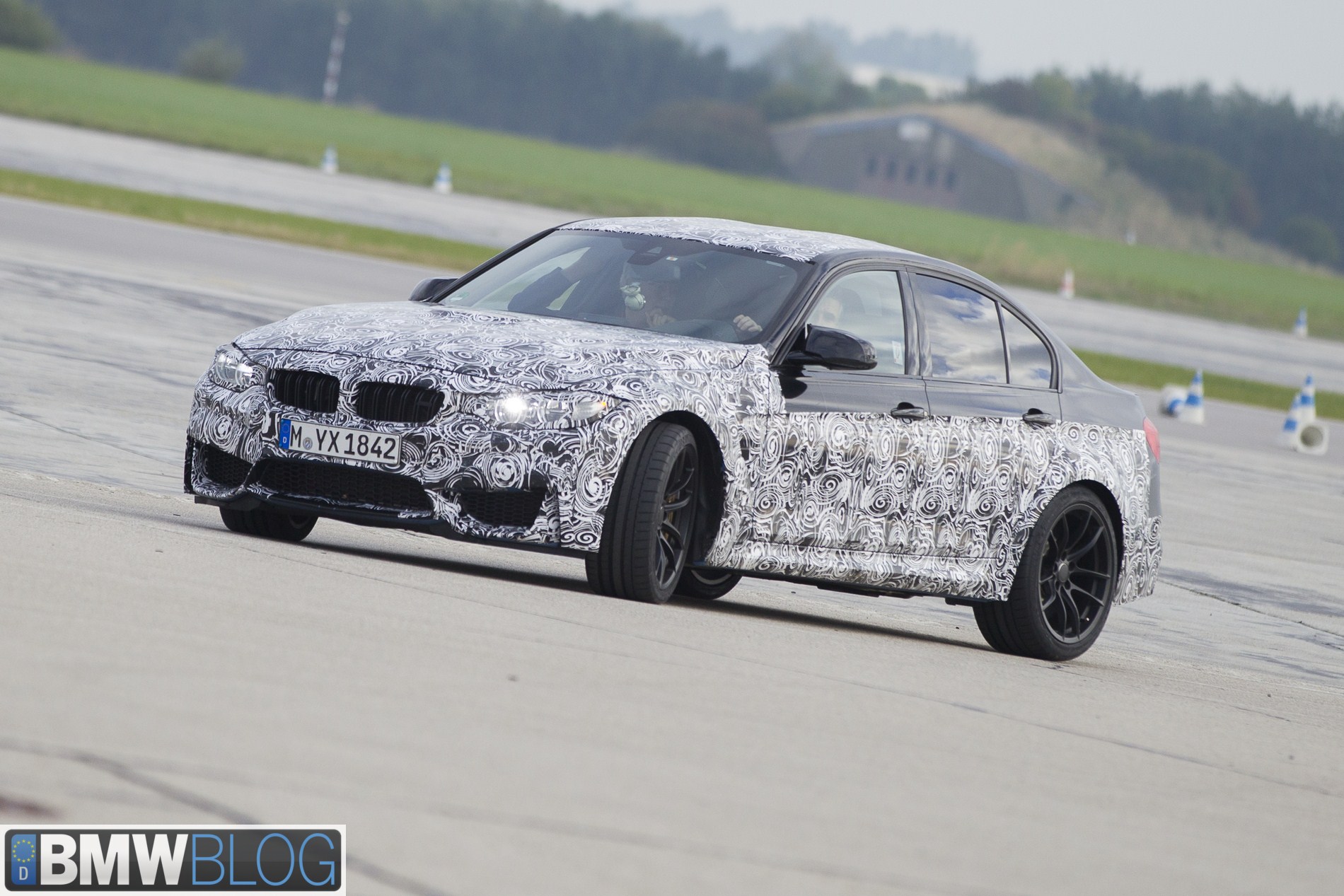DTM race driver Bruno Spengler took part in extensive chassis set-up runs on the Nürburgring-Nordschleife.
Aluminium suspension elements ensure sharper dynamics.
The core expertise of BMW M GmbH resides in creating cars that offer impressive steering precision, on-the-limit adjustability, agility and driving feeling, together with unbeatable traction and outstanding directional stability – all without neglecting everyday usability. In order to blend these attributes with the significantly increased performance capability of the new BMW M3 Sedan and new BMW M4 Coupe, the axles of the outgoing BMW M3 have undergone further development and all relevant components have been newly designed or constructed.
Body structure with optimized rigidity. Reár axle subframe fixed to the body. Lightweight shock absorbers. Optional: Adaptive M suspension. M Compound brakes. Optional: M carbon ceramic brakes.
Low weight and a high level of structural rigidity.
Here again, low weight and a high level of structural rigidity are essential ingredients in ensuring the cars provide an ultra-dynamic driving experience. In the double-joint spring strut front axle alone, the use of a lightweight aluminium construction for components such as control arms, wheel carriers and axle subframes saves five kilograms over a conventional steel design. Play-free ball joints and elastomer bearings developed specially for the BMW M3 Sedan and BMW M4 Coupe ensure an optimum and direct transfer of forces both laterally and longitudinally. An aluminium stiffening plate, CFRP front strut brace and additional bolted joints between the axle subframe and the body sills all help to increase the rigidity of the front structure.
Precise. lightweight front axle. Precise, lightweight rear axle. Electric power steering with optimized feedback. Specially developed performance tyres (mixed sizes) on lightweight forged wheels. CFRP front end strut brace.
Also lighter than the construction in the outgoing BMW M3 is the new five-link rear axle. All the control arms and wheel carriers are manufactured using forged aluminium, which reduces the unsprung masses of the wheel-locating components by around three kilograms compared with the previous model generation. The rigid connection between the rear axle subframe and the body – without the use of elastic rubber elements – is borrowed from motor sport and serves to further improve wheel location and therefore directional stability.
Specially developed forged wheels and tyres.
The development of the tyres for the cars was incorporated from the outset into the construction process for the axles. For high-performance sports cars like the BMW M3 Sedan and BMW M4 Coupe, in particular, steering feel and precision are the foremost considerations in the development of tyres for the front axle, alongside lateral stability and braking forces. At the rear axle, meanwhile, traction, lateral stability and directional stability take centre stage. For this reason, both cars will leave the factory on low-weight forged wheels with mixed-size tyres. The specially developed forged wheels make a significant contribution to the reduction in the cars’ unsprung masses and, in turn, to the optimisation of dynamic qualities and efficiency..
Electric Power Steering with three settings.
The electromechanical steering system used in the BMW M3 Sedan and BMW M4 Coupe is a new development from BMW M GmbH. It has been tuned specially to assist the cause of dynamic driving and offers the gifts of direct steering feeling and precise feedback. The integrated Servotronic function electronically adjusts the level of steering assistance according to the car’s speed, providing optimum steering characteristics at all speeds. The steering for the BMW M3 Sedan and BMW M4 Coupe also offers the driver three steering characteristics as standard, which can be selected at the touch of a button. COMFORT, SPORT and SPORT+ modes allow the level of steering assistance to be adapted to suit the situation at hand and the driver’s personal tastes.
Optional Adaptive M suspension.
The optional Adaptive M suspension likewise comes with COMFORT, SPORT and SPORT+ modes, enabling the driver to choose between a more comfortable damper setting for motorway driving, for example, a stiffer set-up for dynamic driving on country roads, and a third option that minimises wheel movements and maximises dynamic performance for use on the track.
M compound brakes.
With their supreme dynamic attributes in mind, the BMW M3 Sedan and BMW M4 Coupe also come as standard with M compound brakes boasting impressive feel, outstanding stopping power and high resistance to fade. Far lighter than conventional equivalents, these brakes contribute to a substantial reduction in unsprung masses and therefore help to enhance dynamic performance.
M carbon ceramic brakes.
Even lighter M carbon ceramic brakes can also be specified as an option, their further optimised performance attributes equipping them even more effectively for track use.







































































